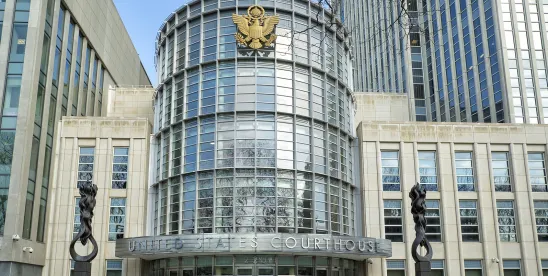In a dramatic development in the contentious prosecution of OneTaste co-founder Nicole Daedone and former sales leader Rachel Cherwitz in a novel one-count indictment of forced labor conspiracy, defense attorneys have taken the rare step of petitioning the Second Circuit Court of Appeals to intervene directly in the ongoing case before Judge Diane Gujarati in the Eastern District of New York. U.S. v. Cherwitz, et al., No. 23-cr-146 (DG) (E.D.N.Y.).
The extraordinary mandamus petition, filed March 7, 2025, effectively asks the appellate court to overrule Judge Gujarati's decisions regarding allegedly stolen privileged documents belonging to OneTaste—a move that legal experts describe as both a high-risk strategy and a decisive escalation after repeated unfavorable rulings from the district court.
Mandamus: The "Nuclear Option" of Legal Remedies
A writ of mandamus—Latin for "we command"—represents one of the most drastic remedies in federal court. Reserved for situations where a judge has clearly exceeded authority or failed to perform required duties, successful mandamus petitions are exceedingly rare in criminal proceedings. Legal experts describe mandamus as the procedural equivalent of a judicial emergency brake—pulled only when a lower court has gone so far off the rails that waiting for a normal appeal would be inadequate.
The petition asks the Second Circuit to reverse Judge Gujarati's September 2024 and February 2025 orders regarding privileged documents, and either dismiss the indictment outright or order an evidentiary hearing on the government's use of allegedly stolen privileged materials.
Alleged FBI Misconduct Takes Center Stage
The mandamus filing comes on the heels of a heated February 26 court conference, after which defense attorneys Jennifer Bonjean and Celia Cohen held an impromptu press conference on the courthouse steps, directing pointed accusations at FBI Special Agent Elliot McGinnis who has been the subject of over two dozen defense motions. When asked by a reporter about a confrontation in the courtroom, Bonjean stated:
"I would not accuse the prosecutor, or even the law enforcement (agent) of misconduct unless I had the goods. And as for McGinnis, we have the goods, there is a record, and yes, absolutely, it should be investigated for criminal misconduct."
Bonjean went on to call for direct intervention from the Department of Justice:
"We think the case should be thrown out. We think that if the Department of Justice looks at this case closely–and we hope they are–that this is exactly the type of case where you have extraordinary FBI misconduct. I don't say that lightly, but THIS is the case they should be looking at...We hope they will and we hope that it will result in a great result, which is dismissal."
Privileged Documents: The Smoking Gun?
At the heart of the mandamus petition lies a bombshell allegation: FBI agent Elliot McGinnis knowingly used stolen privileged corporate documents to investigate OneTaste and build a case against Daedone and Cherwitz.
According to the mandamus and previous defense filings, a former IT contractor named Mitch Aidelbaum illegally accessed OneTaste servers and stole a large volume of material including privileged OneTaste documents in 2017 after his employment ended. Per defense motions, Agent McGinnis obtained a privileged company legal risk assessment in January 2021 and recognized the privileged nature but failed to pass it to a "taint team" or notify OneTaste that its corporate documents had been stolen. Instead, McGinnis reportedly used the privileged document as a roadmap for the investigation, interviewing 20 witnesses specifically identified in the stolen material.
The government did not disclose these documents until late 2024, prompting defense motions to dismiss the indictment. Judge Gujarati denied these motions, finding the documents non-privileged, ruling that defendants lacked standing to assert privilege, and deeming the motions untimely despite their recent discovery.
Judge Gujarati Under Scrutiny
The mandamus petition places Judge Gujarati, who joined the federal bench in 2020 and has presided over only one criminal trial, in a precarious position. Her consistent pattern of rulings favoring government positions despite mounting evidence of misconduct now faces appellate scrutiny.
Throughout pretrial proceedings, Judge Gujarati has repeatedly denied defense requests to conduct hearings over alleged government misconduct, often citing procedural grounds, like timeliness, rather than addressing substantive concerns. During the February 26 conference, she sharply rebuked defense counsel for suggesting prosecutorial impropriety, despite growing evidence of investigative irregularities.
Legal observers note that judges facing mandamus petitions must choose between defending their rulings to the appellate court or reconsidering them in light of the petition—a particularly uncomfortable position for a relatively new jurist with limited trial experience. Notably, a majority of Gujarati's rulings have been "from the bench" in oral rather than written arguments. This may increase the odds of review as the appellate court does not have a written argument upon which to evaluate the district court's decisions.
The Netflix Connection Deepens
New evidence has also emerged regarding the controversial "journals" created for Netflix's documentary on OneTaste. In a motion for reconsideration filed March 4, defense attorneys revealed that Autymn Blanck—sister of key government witness Ayries Blanck—testified in a civil deposition that she accessed her sister's hard drive, extracted photos, and sold them to Netflix for $25,000 in 2022.
This testimony directly contradicts the government's representation that Ayries gave the hard drive to Autymn merely for "safekeeping," a claim Judge Gujarati relied upon in denying defense access to the drive's contents. Moreover, it strengthens the defense narrative that evidence, in this case, originated in commercial media production rather than legitimate investigation and that the made-for-Netflix material was used to secure an indictment. In oral argument at the February 26 conference, Jennifer Bonjean referred to the government's use of an unnecessary search warrant to selectively access the hard drive as an "elaborate construct" to evade Brady and Giglio obligations. In a show of defiance, Bonjean filed a March 4 motion with the court urging Judge Gujarati to reconsider her denial of defense access to the full hard drive.
The government had already withdrawn Ayries Blanck's journal entries from their case-in-chief after defense challenges to their authenticity, despite previously characterizing them as central evidence. In the February 26 conference, Judge Gujarati repeatedly pressed lead prosecutor Gillian Kassner to declare whether the government believed the journals to be authentic. Unsatisfied with the response, Gujarati ordered the government to put in writing its position on their authenticity. In a bombshell filing on March 12 that left observers aghast, the government admitted the journal entries it had relied upon were fakes. It withdrew Ayries Blanck as a witness along with all previous statements regarding the journals made by the prosecution. Celia Cohen and Michael Roboti acting for Rachel Cherwitz immediately called upon the government to dismiss the case and prosecute Ayries Blanck for falsifying evidence and lying to Federal agents. Reaction elsewhere was swift. The Daily Mail declared the government's case to be teetering "on the brink of collapse." In the California civil matter of OneTaste Inc v. Ayries Blanck, the high-profile law firm of Reed Smith filed noticed that it was dropping Blanck as a pro bono client in the wake of the EDNY news.
DOJ Reform on Collision Course with EDNY
The timing of these developments is particularly significant given the Department of Justice's shifting priorities under the Trump administration. Attorney General Pam Bondi's February 5 directive instructed prosecutors to focus on "the most serious, readily provable offenses," including actual human trafficking operations.
President Trump's January 20 executive order "Ending The Weaponization of The Federal Government" specifically cited another EDNY prosecution—United States v. Douglass Mackey—as an example of prosecutorial overreach. Both Mackey and the OneTaste prosecution involve novel applications of conspiracy charges without substantive crimes, supported heavily by media narratives.
With the upheaval in the Southern District of New York resulting in the reassignment of Mayor Eric Adams' case to DOJ headquarters and the termination of numerous SDNY prosecutors, EDNY's traditionally independent approach may face similar scrutiny.
Trial in Doubt as Clock Ticks
While jury selection remains scheduled for May 5, 2025, the mandamus petition casts considerable doubt on whether the trial will proceed as planned. A stay request filed on March 3 asks the district court to pause proceedings pending resolution of the mandamus petition. Should the Second Circuit grant the petition, it could fundamentally reshape the evidence available at trial or potentially end the prosecution entirely.
The case presents novel legal questions with implications far beyond OneTaste executives: Can the government use stolen privileged corporate material to prosecute executives without company consent? Does such conduct constitute the kind of outrageous government behavior that warrants dismissal of an indictment? And how will the new DOJ administration's focus on reform affect long-running prosecutions initiated under previous leadership? This case is rapidly becoming a litmus test for whether the DOJ's new emphasis on reform extends to cases already in the pipeline. The extraordinary step of seeking mandamus relief signals the defense's belief that normal remedies have failed—and may force a reckoning that extends well beyond this single prosecution.




 />i
/>i
